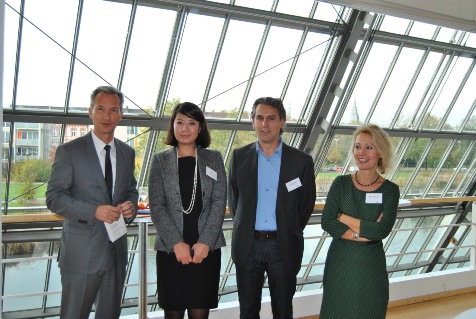08.11.2013
Combined training in professional elderly care in China
Kick-off meeting for the joint project ChinaCare
On 08.11.2013 the official start of BMBF funded project “ChinaCare: Joint training programme for elderly care professionals in China” was staged. It was held at the Science Park in Gelsenkirchen by FIAP as the Kick-off event. More than 30 experts from all over Germany discussed the objectives of the research and development project with the stake holders to enhance elderly care training in the Liaoning Region (China). The foundation of ChinaCare is formation a permanent training partnership between the Chinese Medical School, Panjin (China), and the KBS, Mönchengladbach. The project in is supported by Ms. Lan Yao, the representative of Fushun City in Gelsenkirchen. The project will develop a transferable business model for the export of training between Germany and China, based combining the Chinese culture and German know-how, thereby enforcing a permanent training partnership between the two countries. Due to rapidly changing demographics in China the whole elderly care sector needs to be reformed, specifically the professionalization and modernisation of the elderly care sector including inpatient and outpatient care. The requirement for the institution to be reformed, as well as the requirement for a specific professional qualification to be introduced for elderly care staff, provides an enormous growth market for German training providers.

From left to right: Frank Baranowski, Mayor Gelsenkirchen; Lan Yao, Represenatative City Fushun in Gelsenkirchen; Dr. Rüdiger Klatt, FIAP Gelsenkirchen; Silke Steinberg, FIAP Gelsenkirchen.
Gelsenkirchen Mayor Frank Baranowski paid tribute to the project in his welcome to the event, and emphasised the specific importance which it can have for the region. “For human reasons it is welcome that ‘ChinaCare’ hopes to build education centres for elderly nursing care training. But I also hope that this joint project can have further advantages. Once the proposed partnership has been established it can develop a German-Chinese knowledge exchange, which may lead to more jobs in German training services. There are potential economic benefit to regional health and senior care services because it opens new product markets for the products of our healthcare industries, from walking frames to feeding tubes. I can only encourage the regional companies in these industries to get involved!”



